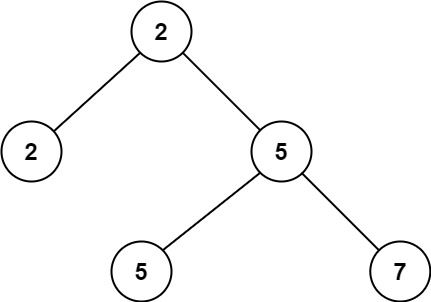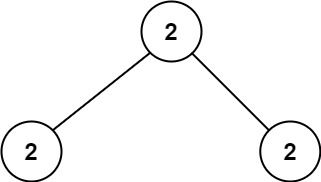| comments | difficulty | edit_url | tags | |||
|---|---|---|---|---|---|---|
true |
简单 |
|
给定一个非空特殊的二叉树,每个节点都是正数,并且每个节点的子节点数量只能为 2 或 0。如果一个节点有两个子节点的话,那么该节点的值等于两个子节点中较小的一个。
更正式地说,即 root.val = min(root.left.val, root.right.val) 总成立。
给出这样的一个二叉树,你需要输出所有节点中的 第二小的值 。
如果第二小的值不存在的话,输出 -1 。
示例 1:
输入:root = [2,2,5,null,null,5,7] 输出:5 解释:最小的值是 2 ,第二小的值是 5 。
示例 2:
输入:root = [2,2,2] 输出:-1 解释:最小的值是 2, 但是不存在第二小的值。
提示:
- 树中节点数目在范围
[1, 25]内 1 <= Node.val <= 231 - 1- 对于树中每个节点
root.val == min(root.left.val, root.right.val)
直接 DFS 遍历二叉树,找到大于 root.val 的最小值。若不存在,则返回 -1。
时间复杂度
# Definition for a binary tree node.
# class TreeNode:
# def __init__(self, val=0, left=None, right=None):
# self.val = val
# self.left = left
# self.right = right
class Solution:
def findSecondMinimumValue(self, root: Optional[TreeNode]) -> int:
def dfs(root):
if root:
dfs(root.left)
dfs(root.right)
nonlocal ans, v
if root.val > v:
ans = root.val if ans == -1 else min(ans, root.val)
ans, v = -1, root.val
dfs(root)
return ans/**
* Definition for a binary tree node.
* public class TreeNode {
* int val;
* TreeNode left;
* TreeNode right;
* TreeNode() {}
* TreeNode(int val) { this.val = val; }
* TreeNode(int val, TreeNode left, TreeNode right) {
* this.val = val;
* this.left = left;
* this.right = right;
* }
* }
*/
class Solution {
private int ans = -1;
public int findSecondMinimumValue(TreeNode root) {
dfs(root, root.val);
return ans;
}
private void dfs(TreeNode root, int val) {
if (root != null) {
dfs(root.left, val);
dfs(root.right, val);
if (root.val > val) {
ans = ans == -1 ? root.val : Math.min(ans, root.val);
}
}
}
}/**
* Definition for a binary tree node.
* struct TreeNode {
* int val;
* TreeNode *left;
* TreeNode *right;
* TreeNode() : val(0), left(nullptr), right(nullptr) {}
* TreeNode(int x) : val(x), left(nullptr), right(nullptr) {}
* TreeNode(int x, TreeNode *left, TreeNode *right) : val(x), left(left), right(right) {}
* };
*/
class Solution {
public:
int ans = -1;
int findSecondMinimumValue(TreeNode* root) {
dfs(root, root->val);
return ans;
}
void dfs(TreeNode* root, int val) {
if (!root) return;
dfs(root->left, val);
dfs(root->right, val);
if (root->val > val) ans = ans == -1 ? root->val : min(ans, root->val);
}
};/**
* Definition for a binary tree node.
* type TreeNode struct {
* Val int
* Left *TreeNode
* Right *TreeNode
* }
*/
func findSecondMinimumValue(root *TreeNode) int {
ans, v := -1, root.Val
var dfs func(*TreeNode)
dfs = func(root *TreeNode) {
if root == nil {
return
}
dfs(root.Left)
dfs(root.Right)
if root.Val > v {
if ans == -1 || ans > root.Val {
ans = root.Val
}
}
}
dfs(root)
return ans
}/**
* Definition for a binary tree node.
* function TreeNode(val, left, right) {
* this.val = (val===undefined ? 0 : val)
* this.left = (left===undefined ? null : left)
* this.right = (right===undefined ? null : right)
* }
*/
/**
* @param {TreeNode} root
* @return {number}
*/
var findSecondMinimumValue = function (root) {
let ans = -1;
const v = root.val;
function dfs(root) {
if (!root) {
return;
}
dfs(root.left);
dfs(root.right);
if (root.val > v) {
if (ans == -1 || ans > root.val) {
ans = root.val;
}
}
}
dfs(root);
return ans;
};
